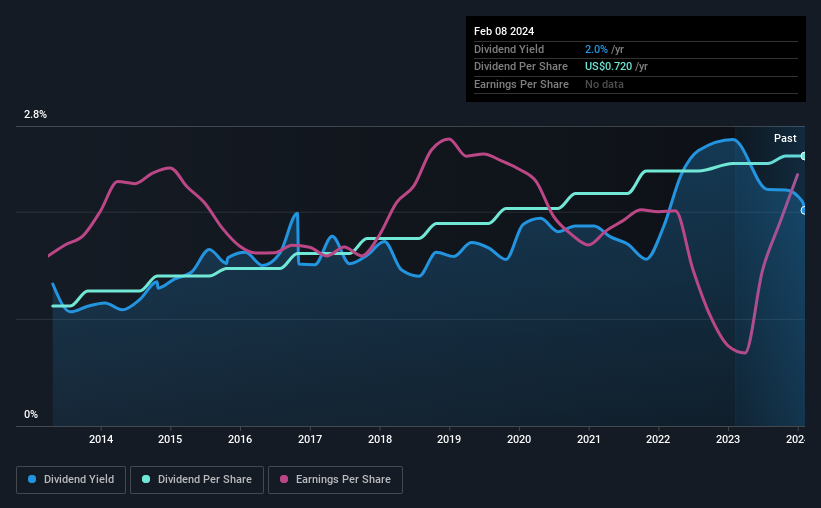Read This Before Considering The Gorman-Rupp Company (NYSE:GRC) For Its Upcoming US$0.18 Dividend
Readers hoping to buy The Gorman-Rupp Company (NYSE:GRC) for its dividend will need to make their move shortly, as the stock is about to trade ex-dividend. Typically, the ex-dividend date is one business day before the record date which is the date on which a company determines the shareholders eligible to receive a dividend. The ex-dividend date is important because any transaction on a stock needs to have been settled before the record date in order to be eligible for a dividend. In other words, investors can purchase Gorman-Rupp's shares before the 14th of February in order to be eligible for the dividend, which will be paid on the 8th of March.
The company's next dividend payment will be US$0.18 per share, on the back of last year when the company paid a total of US$0.72 to shareholders. Based on the last year's worth of payments, Gorman-Rupp stock has a trailing yield of around 2.0% on the current share price of US$35.77. If you buy this business for its dividend, you should have an idea of whether Gorman-Rupp's dividend is reliable and sustainable. So we need to investigate whether Gorman-Rupp can afford its dividend, and if the dividend could grow.
See our latest analysis for Gorman-Rupp
Dividends are typically paid from company earnings. If a company pays more in dividends than it earned in profit, then the dividend could be unsustainable. Gorman-Rupp is paying out an acceptable 53% of its profit, a common payout level among most companies. That said, even highly profitable companies sometimes might not generate enough cash to pay the dividend, which is why we should always check if the dividend is covered by cash flow. Luckily it paid out just 24% of its free cash flow last year.
It's encouraging to see that the dividend is covered by both profit and cash flow. This generally suggests the dividend is sustainable, as long as earnings don't drop precipitously.
Click here to see the company's payout ratio, plus analyst estimates of its future dividends.
Have Earnings And Dividends Been Growing?
Companies with falling earnings are riskier for dividend shareholders. If business enters a downturn and the dividend is cut, the company could see its value fall precipitously. So we're not too excited that Gorman-Rupp's earnings are down 2.7% a year over the past five years.
Many investors will assess a company's dividend performance by evaluating how much the dividend payments have changed over time. Since the start of our data, 10 years ago, Gorman-Rupp has lifted its dividend by approximately 8.4% a year on average. Growing the dividend payout ratio while earnings are declining can deliver nice returns for a while, but it's always worth checking for when the company can't increase the payout ratio any more - because then the music stops.
The Bottom Line
Has Gorman-Rupp got what it takes to maintain its dividend payments? We're not enthused by the declining earnings per share, although at least the company's payout ratio is within a reasonable range, meaning it may not be at imminent risk of a dividend cut. While it does have some good things going for it, we're a bit ambivalent and it would take more to convince us of Gorman-Rupp's dividend merits.
If you're not too concerned about Gorman-Rupp's ability to pay dividends, you should still be mindful of some of the other risks that this business faces. Case in point: We've spotted 1 warning sign for Gorman-Rupp you should be aware of.
A common investing mistake is buying the first interesting stock you see. Here you can find a full list of high-yield dividend stocks.
Have feedback on this article? Concerned about the content? Get in touch with us directly. Alternatively, email editorial-team (at) simplywallst.com.
This article by Simply Wall St is general in nature. We provide commentary based on historical data and analyst forecasts only using an unbiased methodology and our articles are not intended to be financial advice. It does not constitute a recommendation to buy or sell any stock, and does not take account of your objectives, or your financial situation. We aim to bring you long-term focused analysis driven by fundamental data. Note that our analysis may not factor in the latest price-sensitive company announcements or qualitative material. Simply Wall St has no position in any stocks mentioned.

